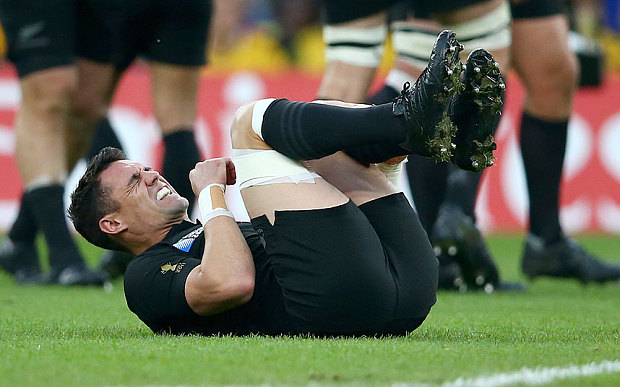Exclusive book extracts All Blacks legend recalls how injuries led to fears of rejection and almost quitting the game.
The thought crept up on me slowly, but once it took hold, it refused to let go. It would sneak into my mind during training, when I was pushing weights. Or in the dead of night, when I couldn’t sleep. Most often, it made itself at home during rehab. Endless, thankless rehab, trying to heal a broken body. The thought was: Why am I doing this? Why don’t I just retire?
My body was shot. I was stuck in what felt like an endless cycle: play a few games, get a new injury, then give in to weeks of rehab again. Every time I stepped onto the field I would wonder which part would give way next. My mind was full of what-ifs and fears I couldn’t speak aloud. It was the winter of 2013, and rugby — for so long a joy — had become a prison.
Injuries really start to weigh on you as you get older. They feel like a betrayal, like your body letting you down.
Then it would be back to the stands on game day. All that time on the sideline I’d stare out at the team, the joy they felt, the explosive athleticism they displayed, and a loneliness would set in. Watching the young guys I felt a real sense of loss. I’d been that way once, through the 2000s. It felt like the whole team was a big gang of friends. You’d train hard, play hard and then socialise together afterwards. We felt indestructible. It was a fantastic lifestyle.
• Carter: The day I was tempted to join the NFL
The game which I had always loved had become a ferocious beast, one which drained me of energy without restoring it the way it once had.
My mind would drift back to 2011, when I signed my four-year contract. I knew in my heart that if it had been a two-year deal I’d have been gone.
The one thing which kept me sane through this period was my sabbatical. It was booked for the end of 2013, and became a beacon to me. If it hadn’t been there, I’d probably have just walked away from it all.
The worst part was that I didn’t feel I could talk to anyone about these thoughts, couldn’t breathe life into them by saying them. It’s not how rugby players are supposed to feel. We’re marketed as if we’re made of granite. That image helps pull in spectators and sponsors, but it can also mean you feel like you have to live up to a particular kind of rugged image, regardless of how you’re feeling inside.
It’s a brutal sport, and exacts a heavy toll. I’d speak to Honor about it endlessly. She really coaxed me through those months, with empathy drawn from her own experiences as an athlete.
I decided to treat my mental issues the way I would my physical — to go and get help from professionals. Fortunately the All Blacks have, in Gilbert Enoka, one of the best mental skills coaches in sport. I started spending more and more time with him and Ceri Evans, another top mental skills guy I’d dealt with through the All Blacks. I put a real focus on remembering that I didn’t have long left in what is one of the best jobs in the world. That I was incredibly fortunate to be there. I concentrated on processes to shorten my thinking, structures which could get me through those dark patches.
• Carter: World Cup final was stuff of dreams
The whole time I was terrified of Steve Hansen finding out I had these feelings. Our relationship had deteriorated badly in 2013, to the point where I wouldn’t talk to him about anything — I’d just bottle it all up. I would look at him and think about how busy he was, how many people he had to juggle, and think: ‘I don’t want to bother him’. He’s not a naturally open guy either, so we each ended up making a lot of assumptions about what we were thinking or feeling.
In my mind, I started to doubt his faith in me. I thought, ‘Steve Hansen doesn’t want me in this team any more. And why would he? I’m injured all the time, he can’t rely on me’. Those doubts wouldn’t leave me alone.
Gilbert picked up on it, with his usual intuitive power. He finally teased out of me some of my doubts regarding my future, Steve, and my place in the team. To his credit, Gilbert realised that there was a huge gap between my assumptions about Steve’s thinking, and what Steve’s impressions and intentions were. Gilbert suggested Steve and I start meeting for coffee once a week, to talk about rugby and our plans and so on.
We had the first session in September, and it was revelatory. When I opened up to him about my thoughts he was shocked. He couldn’t believe what I’d been thinking. That was a huge relief, and started me thinking more positively about this end-of-year tour, viewing it less as make-or-break for my career and more as an opportunity to get some game time, without worrying too much about its quality.
That set me up for my hundredth game, against England at Twickenham. There are no bigger stages in world rugby, so in some ways it was a perfect way to ring it up.
It was an amazing Test lead-up. Despite the elation, I was a long way from fully fit. I could run, but not freely. It was week three after the cortisone shot, so I knew it would soon be wearing off. In my mind, though, I was so determined to get on the field that I almost didn’t care what happened beyond then. Running out onto Twickenham, in my golden boots, was an extraordinary feeling. The crowd was so generous, and gave me a huge ovation. I had goose bumps, and do even now thinking back to it.
Then we did a haka, which featured Liam Messam, who was leading it that day, pulling me up by the jersey. It was completely unplanned, and unexpected. I almost didn’t know what to do, and was nearly overcome by the moment — it’s a mark of respect which is very rare, and has only happened to players very occasionally during my career.
The game started brilliantly. I was loving the occasion, playing better than I had in months. All the agonising doubt was being washed away with every step, pass and punt. Then, 20 minutes in, I received the ball, stepped, and took it into the tackle. As I went down, I felt my Achilles. It wasn’t just tight — it was a sharp pain. I got up, and hobbled through the next five minutes. But I knew it was over. I realised that I wasn’t helping my team, hanging around on one leg, and very reluctantly went off. It was a horrible way to end the game, especially after the energy of the week. Worse still, a year earlier I’d left the field for the same reason. Only this time I knew the injury was more serious.
As I limped from the field my thoughts moved inexorably to my sabbatical. It was meant to be a time to rest, recuperate, retune my body and rediscover my love of the game by testing life without it. Now it would be dominated by another rehab. At that moment I believed there was a very good chance I’d played my last game of rugby.























